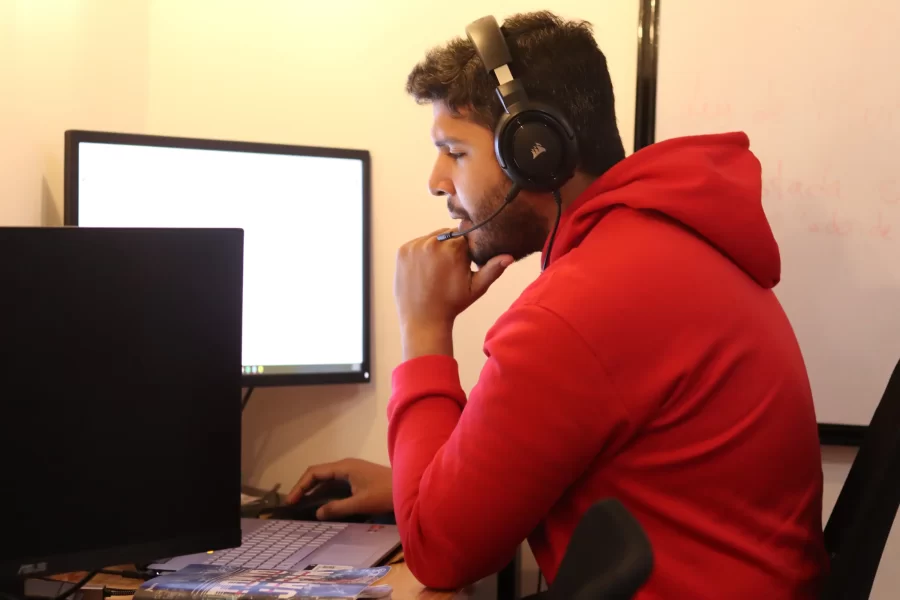When talking about web development, the first stigma we need to destroy is the one that says that you just need to know how to put some lines of code together and that would suffice. Web developers are creative, and need to understand complicated techniques. But don’t worry there are also tools to help you through this process and we will get all of that covered in this article.
To better grasp what you need to know, you’ll find a detailed guide in the complete web developer roadmap.
Front End (HTML/CSS/JS)
It’s extremely important to cover the front-end deal completely. To do this, every web developer definitely should learn the three basic building blocks HTML, CSS, and JavaScript.
The first one to get into will always be HTML since it allows the user to create and structure sections, paragraphs, headings, links, and blockquotes for web pages and applications. It is important to highlight the fact that HTML is not a programming language, meaning it can’t create dynamic functionality.
Instead, it makes it possible to organize and format documents, similarly to what Microsoft Word does. When working with HTML, we use simple code structures (tags and attributes) to mark up a website page.
Next will follow CSS, which stands for Cascading Style Sheets with an emphasis placed on “Style”. CSS comes through and specifies your document’s style—page layouts, colors, and fonts are all determined with CSS.
Think of HTML as the bone structure and CSS is the skin that covers it. Now we get into the deep side of everything which is of course JavaScript, since it allows you to take ordinary web elements and make them interactive.
JavaScript is high in demand nowadays and it also comes with a variety of languages like PHP, Python, and ASP.Net. You can even specialize in JavaScript if you go for MEAN Stack or MERN stack then you are going to have to go deep into this language because it will be your front-end as well as a back-end language.
Frameworks
A framework is exactly as their name implies, a frame in which you work. It is usually a library or some other software that provides a skeleton for your application. This will be a relief to some of you but as a programmer, you don’t need to start from scratch when you have tools designed to help you with your projects.
Web developers use frameworks to build applications more efficiently.
Git and GitHub are a Must

Git is one of the most popular version control systems in most organizations. So, if your goal is to be a web developer then learning how to use Git correctly is a must do.
It’s important to cover the basic commands, such as cloning and pushing to repositories, which contain a collection of files with various versions of a project.
We import these files from the repository into the project so we can closely follow updates and see who is making them. We also need to know how to merge branches and more.
While GitHub is a service where you can push your Git repositories to host your code. It also provides access control and several collaboration features, such as wikis and basic task management tools for every project.
Get some API knowledge
API is the acronym for Application Programming Interface, which is a software intermediary that allows two applications to talk to each other. Each time you use an app like Facebook, send an instant message or check the weather on your phone, you’re using an API. So to put it simply, is just the way to handle third-party data, needless to say, you will need to use this a lot.
Know how to build and use a Database
A DB is any collection of data or information, that is specially organized for rapid search and retrieval by a computer (or a system). They are structured to facilitate the storage, retrieval, modification, and deletion of data in conjunction with various data-processing operations.
The first DB model you need to master will be the relational one. They consist of the SQL language and are a collection of data items with pre-defined relationships between them. These items are organized as a set of tables with columns and rows, creating tables.
After deep diving into the SQL databases, you can go up to the next level, the non-relational or No SQL ones. This database does not use the tabular schema of rows and columns found in most traditional database systems.
Instead, non-relational databases use a storage model that is optimized for the specific requirements of the type of data being stored. Sounds a little confusing, right? Don’t worry, once you get into it you will find that it’s not that hard to handle.
Authentication Procedures

Here we get in close touch with the so-called back-end part of the deal. When working as a web developer there is a huge chance that you will be dealing with user authentication to track users on a specific website.
This process is what allows users to log in, log out, or get access to specific resources from their accounts. Also, the user’s account security heavily relies on this kind of process.
There are many ways in which you can implement an authentication and they will all depend on which language you’re using for your back end platform.
For example, if you’re using React on the front end and NodeJS in the back end then you might use JWT (JSON Web Tokens) for authentication, if you are using PHP then you will have to work with session and cookies, you can also use third parties like Google or Twitter for login.
So there are multiple ways to work with authentication but it’s an important concept in web development to learn and implement.
Problem Solving and Searching Skills
If you want to work as a web developer, then you will need some problem-solving and searching skills. They don’t have to be something you were born with, these can be built through some projects, data structure, and algorithms, even solving puzzles can help you with this. The important thing is that you keep practicing on getting those skills.
Whether you’re a beginner or an experienced developer, you will be searching for the information, syntax, or solution required to solve a problem while building an application. Don’t worry though, Google will be your best friend through this.
Never Skip the Testing Phase
A lot of developers are not used to applying the testing phase or they just don’t give it the importance it has. Testing and documenting the bugs you may find while testing is the best way to improve the application accordingly.
Also, it will help you to solve similar bugs in the future, resulting in saving a lot of time. Don’t pay attention to anyone who tells you that testing is not important, always make sure your app functions correctly and smoothly.
Deployment
Last but not least, as a web developer you should know about maintenance, scaling, migrating, and deploying your code on different platforms like cloud, AWS, Heroku, Netlify, etc.
A lot of options are there so you can spend some time learning about these platforms, how these services work, and how to deploy or maintain your code on these platforms.
Now you know the things every web developer should know, and I can assure you our team has it covered!
See more articles by Paola Rodríguez





